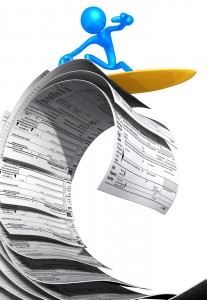Accounting and Bookkeeping Tutorial
Preface
 The following written tutorial will be for those of you who would like to learn basic bookkeeping skills and to establish a good solid grasp of basic accounting principles.
The following written tutorial will be for those of you who would like to learn basic bookkeeping skills and to establish a good solid grasp of basic accounting principles.
Before continuing, I should mention that the information I bring you is the result of knowledge and skills I acquired through self-teaching and personal research and not as a result of having acquired any official accounting qualifications from any professional awarding bodies. Whether this will prove to be a disadvantage, an advantage, or of no consequence whatsoever, I will leave it to you to decide. The content will no doubt speak for itself.
My own past flirtation with the subject of Accounting was not a happy one. I studied it for one year at university many years ago before deciding to switch to Mathematics. I soon discovered that, apart from basic addition and subtraction, there was very little in common between the two subjects, and with Maths holding an appeal for me which Accounting could not compete with, it’s fair to say I’m glad I made the switch.
 If you’re anything like I used to be, you will find the mere prospect of sitting down to sort out your accounts a daunting and tedious one. This guide aims to make any accounting phobias you may have a thing of the past and to break down bookkeeping methods and accounting principles in such a way as to help you overcome any aversions you have for completing your own accounts.
If you’re anything like I used to be, you will find the mere prospect of sitting down to sort out your accounts a daunting and tedious one. This guide aims to make any accounting phobias you may have a thing of the past and to break down bookkeeping methods and accounting principles in such a way as to help you overcome any aversions you have for completing your own accounts.
Understanding how costly it can be to hire an accountant, especially if you’re a small business, I also hope to provide you with the guidance and means necessary to manage and submit your own accounts, although I would of course advise caution if you decide to do this. My guide aims to make you self-sufficient in this respect but as always you should seek professional assistance if you’re still unsure.
 One thing I cannot hope to do is to make accounting enjoyable or interesting. When numbers find themselves preceded by pound signs for the purposes of assigning – and keeping track of – a very arbitrary, man-made and superficial conception of material worth, then numbers lose all their majesty as far as I’m concerned. I hold strongly to the belief that the field of accounting is an abuse of numbers and a vulgar misuse of mathematics. However, until we find a better universal currency of credit than money I suppose we’re stuck with the practice of trying to make sure our books balance. I suggest then that we find a way to make the whole process of accounting as pain-free as possible.
One thing I cannot hope to do is to make accounting enjoyable or interesting. When numbers find themselves preceded by pound signs for the purposes of assigning – and keeping track of – a very arbitrary, man-made and superficial conception of material worth, then numbers lose all their majesty as far as I’m concerned. I hold strongly to the belief that the field of accounting is an abuse of numbers and a vulgar misuse of mathematics. However, until we find a better universal currency of credit than money I suppose we’re stuck with the practice of trying to make sure our books balance. I suggest then that we find a way to make the whole process of accounting as pain-free as possible.
One way to do this is to become more efficient with your accounts in order to minimise the time you need to spend engaging with them. I am confident that the following tutorial will go some way towards helping you do this. More than that, it is my hope that once you have finished carefully reading and working through the information and strategies contained herein, you’ll be able to navigate your accounts with ease… much like the little fella happily surfing his tax forms in the picture directly below. So let’s get started.
1. What is accounting?
2. An overview of the Basic Principles of the Accounting System
3. The Accounting Equation
4. The Trading Profit and Loss Account (TPLA)
5. The Balance Sheet
6. The link between the TPLA and the Balance Sheet
7. Introducing the cashbook, the ledgers and the five accounting groups
8. Double-entry Bookkeeping
9. The Trial Balance: making sure you ‘balance the books’
10. A worked example to make sure you can practically implement the information and methods contained in chapters 1-9 of this tutorial
11. Instructions for those of you who would like to receive my free, ready-made, do-it-yourself accounting templates.

